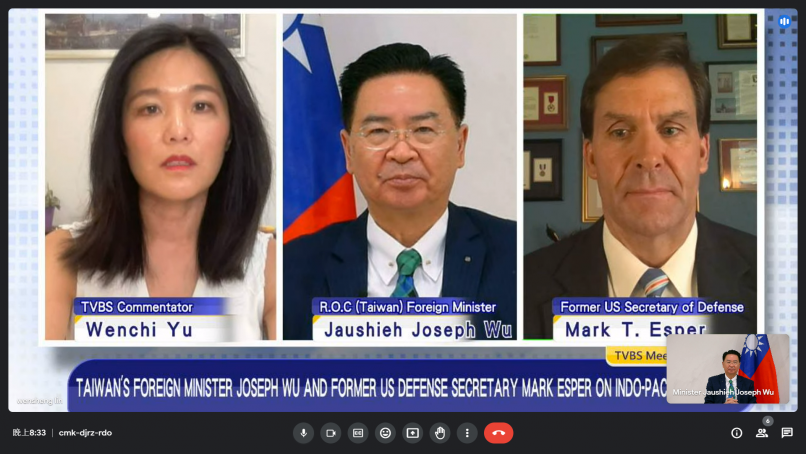Foreign Minister Wu, former US Defense Secretary Esper talk cross-strait...
2023/07/20
Minister of Foreign Affairs Jaushieh Joseph Wu and former U.S. Secretary of Defense Mark Esper took part in an online interview July 17 to discuss the importance of maintaining peace across the Taiwan Strait.
During the discussion, televised on “TVBS Meeting Room” and streamed by the Taipei City-based television network TVBS on its YouTube channel, Wu and Esper both agreed that extending Taiwan’s mandatory military service to one year is the correct decision given escalating threats from China. According to the minister, it is the responsibility of the people of Taiwan to defend their homeland.
Despite Beijing’s ongoing coercion, Wu said the government is doing all it can to maintain the peaceful cross-strait status quo while continuing to enhance Taiwan’s self-defense readiness. Demonstrating its determination on this front is one way it is garnering global support, the minister said.
The recent remarks from the EU and other major democracies stressing the importance of cross-strait stability and opposing unilateral change to the status quo all serve as an effective deterrent to China’s authoritarian expansion, he added.
The minister said as Taiwan produces 60 percent of all semiconductor chips and 92 percent of advanced chips, a conflict in the region will cause a disruption in the global supply chain. While Taiwan’s semiconductor firms are expanding offshore production to help strengthen global supply chain resilience, he said local design and manufacturing are still irreplaceable due to decades of development, adding that more foreign investment in Taiwan will make the country safer.
The power balance across the strait has changed following Beijing’s military provocations, Esper said, urging Washington to reexamine its policy and send China a strong, clear message of deterrence.
Esper also said the U.S. should conclude trade and double tax avoidance agreements with Taiwan to help reduce Taiwan’s dependence on China. He added that it is important to keep China from acquiring advanced semiconductor technology so as to prevent totalitarian governments from gaining an advantage in key sectors such as aviation, biotechnology, and information and communications technology.
Source: Taiwan Today (https://taiwantoday.tw/index.php)












